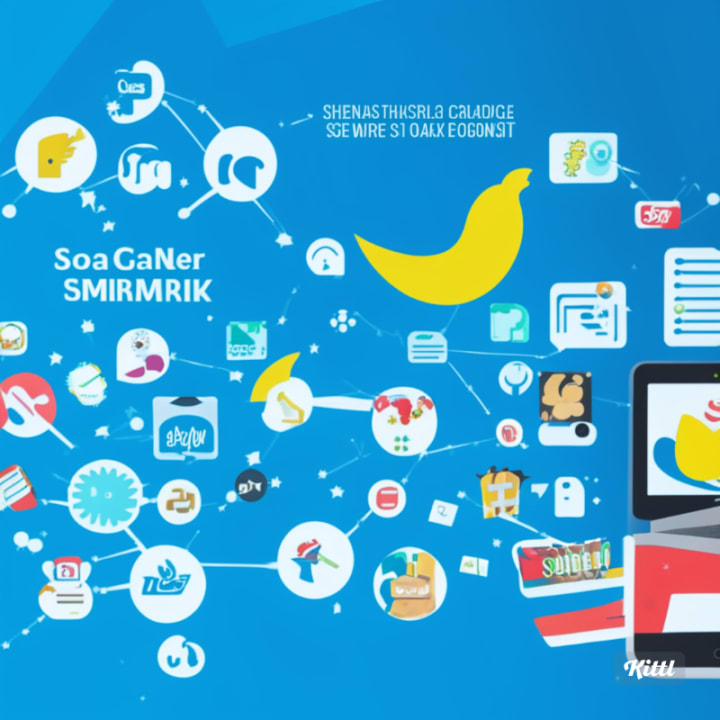Content warning
This story may contain sensitive material or discuss topics that some readers may find distressing. Reader discretion is advised. The views and opinions expressed in this story are those of the author and do not necessarily reflect the official policy or position of Vocal.
ecommerce marketing on social media
Why Ecommerce is the Future: Leveraging Social Media for Successful Marketing

Ecommerce has been on the rise for several years, but the COVID-19 pandemic has accelerated its growth even further. With lockdowns and social distancing measures in place, more people than ever are shopping online. In fact, ecommerce sales in the US alone grew by 44% in 2020, reaching a total of $861 billion. But ecommerce isn't just a temporary trend brought on by the pandemic. It's the future of retail, and businesses that don't adapt risk falling behind.
Looking for a game-changing email marketing solution? Look no further than our industry-leading automation software! click here

One of the keys to thriving in the ecommerce landscape is effective marketing, and social media is one of the most powerful tools available for ecommerce businesses. In this article, we'll explore why ecommerce is the future and how social media can help businesses succeed in the digital age.
Why Ecommerce is the Future
There are several reasons why ecommerce is the future of retail, including:
Convenience: Shopping online is incredibly convenient. Customers can browse and purchase products from the comfort of their own homes, without having to leave the house or even get dressed.
Looking for a game-changing email marketing solution? Look no further than our industry-leading automation software! click here

Personalization: Ecommerce businesses can use data and analytics to personalize the shopping experience for each customer. This can include recommending products based on their previous purchases, showing them items that are relevant to their interests, and offering personalized discounts and promotions.
Global Reach: Ecommerce businesses aren't limited by geography. They can sell products to customers all over the world, which means they have access to a much larger customer base than traditional brick-and-mortar stores.
Lower Costs: Ecommerce businesses don't have the same overhead costs as brick-and-mortar stores. They don't need to pay for rent, utilities, or as many employees, which means they can offer lower prices to customers.
Looking for a game-changing email marketing solution? Look no further than our industry-leading automation software! click here

Flexibility: Ecommerce businesses can be much more flexible than traditional retail stores. They can quickly adjust their inventory and pricing based on demand, which means they can respond to trends and changes in the market much more quickly than brick-and-mortar stores.
These factors make ecommerce an incredibly attractive option for both customers and businesses, and they're only going to become more important in the coming years.
Looking for a game-changing email marketing solution? Look no further than our industry-leading automation software! click here

The Role of Social Media in Ecommerce Marketing
Social media has become a critical tool for ecommerce businesses looking to reach new customers and grow their sales. Here are just a few of the reasons why social media is so powerful for ecommerce marketing:
Huge Reach: Social media platforms like Facebook, Instagram, and Twitter have billions of users worldwide. This means that ecommerce businesses have access to a massive audience that they can target with their marketing messages.
Targeted Advertising: Social media platforms allow businesses to target their advertising to specific groups of people based on factors like age, gender, location, interests, and more. This means that businesses can ensure that their marketing messages are reaching the right people at the right time.
Looking for a game-changing email marketing solution? Look no further than our industry-leading automation software! click here

Visual Content: Ecommerce businesses sell products, and social media is an incredibly visual medium. Platforms like Instagram and Pinterest are particularly well-suited to showcasing products in a visually appealing way, which can help businesses grab customers' attention and drive sales.
User-Generated Content: Social media platforms are also home to a wealth of user-generated content, including reviews, comments, and posts from customers. This content can be incredibly valuable for ecommerce businesses, as it can help build trust and credibility with potential customers.
Engagement: Social media platforms allow businesses to engage directly with customers in real-time. This means that businesses can respond to customer inquiries, resolve issues, and build relationships with their customers in a way that's simply not possible with traditional advertising channels.
Looking for a game-changing email marketing solution? Look no further than our industry-leading automation software! click here

Social media is a powerful tool for ecommerce businesses, but it's important to use it effectively. Here are a few tips for getting the most out of social media for ecommerce marketing:
Choose the Right Platforms: Not all social media platforms are created equal. Different platforms have different audiences and different strengths, so it's important to choose the platforms that are most likely to resonate with your target audience.
Create Quality Content: Social media is a crowded space, so it's important to create content that stands out. This means using high-quality images and videos, writing compelling captions, and being creative with your content.
Looking for a game-changing email marketing solution? Look no further than our industry-leading automation software! click here

Engage with Your Customers: Social media is a two-way conversation. Make sure you're responding to customer comments and messages in a timely and helpful manner, and use social media as an opportunity to build relationships with your customers.
Use Paid Advertising: While organic reach on social media is still possible, it's becoming increasingly difficult. To get the most out of social media for ecommerce marketing, it's important to invest in paid advertising to ensure that your messages are reaching the right people.
Measure Your Results: Finally, it's important to measure the results of your social media marketing efforts. Use analytics tools to track engagement, conversions, andsales, and use this data to refine your strategy and optimize your campaigns for maximum effectiveness.
Examples of Successful Ecommerce Marketing on Social Media
To give you a better sense of how ecommerce businesses are using social media to drive sales and grow their customer base, let's take a look at a few examples:
Glossier: Glossier is a beauty brand that has built a cult following on social media. The brand has a strong presence on Instagram, where it showcases its products in a visually appealing way and encourages customers to share their own photos using the hashtag #glossier. Glossier also uses Instagram Stories to showcase user-generated content, offer behind-the-scenes glimpses of the brand, and promote its products with limited-time offers and discounts.
Warby Parker: Warby Parker is an eyewear company that has used social media to build a strong brand identity and engage with its customers. The company has a strong presence on Instagram, where it showcases its products in a visually appealing way and encourages customers to share their own photos using the hashtag #warbyparker. Warby Parker also uses social media to highlight its corporate social responsibility efforts, including its Buy a Pair, Give a Pair program that donates a pair of glasses to someone in need for every pair purchased.
Amazon: Amazon is the world's largest ecommerce company, and it has used social media to build a massive following and drive sales. The company has a strong presence on all the major social media platforms, including Facebook, Twitter, and Instagram, where it uses targeted advertising to reach specific groups of customers. Amazon also uses social media to promote its Prime membership program, offer limited-time deals and discounts, and highlight its diverse product offerings.
Looking for a game-changing email marketing solution? Look no further than our industry-leading automation software! click here

Conclusion
Ecommerce is the future of retail, and social media is a critical tool for ecommerce businesses looking to reach new customers and grow their sales. By leveraging the power of social media to create engaging content, target specific audiences, and build relationships with customers, ecommerce businesses can thrive in the digital age. If you're an ecommerce business looking to grow your sales and reach new customers, social media should be a key part of your marketing strategy.





Comments
There are no comments for this story
Be the first to respond and start the conversation.